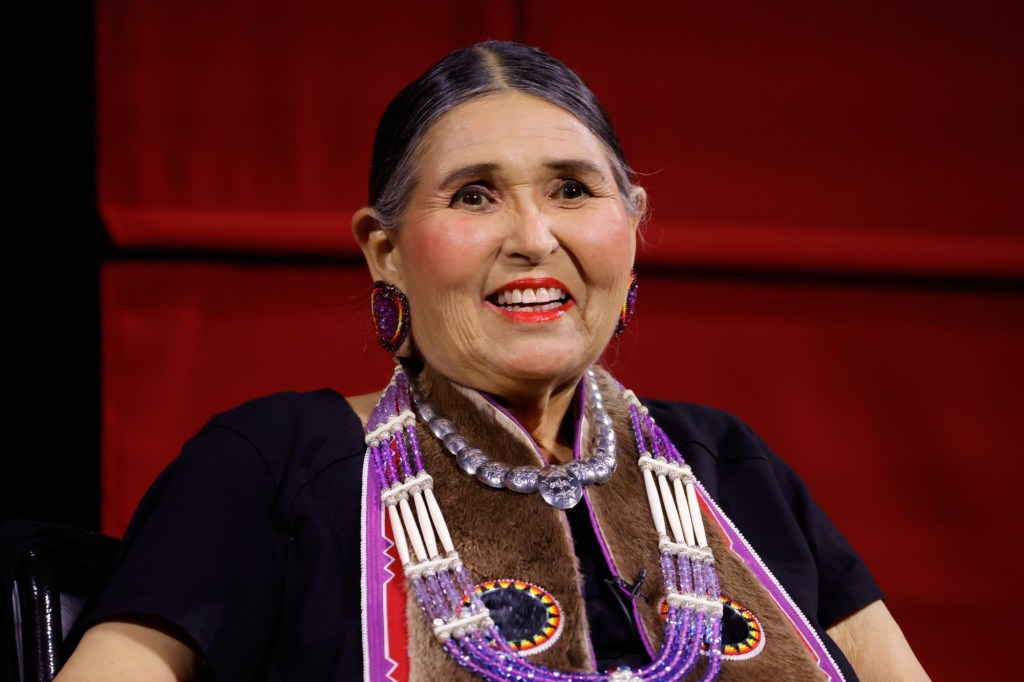
Sacheen Littlefeather (born Marie Louise Cruz, 1946 – 2022) on stage at AMPAS Presents An Evening with Sacheen Littlefeather at Academy Museum of Motion Pictures on September 17, 2022 in Los Angeles, California. (Photo by Frazer Harrison/Getty Images)
As Lily Gladstone is set to appear at Sunday’s Academy Awards, the first Native American woman nominated for a best actress Oscar, her historic moment could wind up competing for attention with a controversial new development in a case that has made waves in Hollywood and in Native American circles for 50 years.
A report in a leading Hollywood trade publication seeks to shed new light on the case of Sacheen Littlefeather, the late Bay Area activist who made global headlines at the 1973 Oscars when, dressed in a buckskin dress and presenting herself as Apache, she refused Marlon Brando’s best actor trophy to protest the misrepresentation of American Indians in the film and TV industry.
After Littlefeather’s death in 2022, her surviving sisters came forward in an explosive investigative report to accuse Littlefeather of lying about her credentials and being a “Pretendian,” someone who falsely claims to be Native American for fame or professional opportunities.
Now The Hollywood Reporter, citing newly uncovered 200-year-old documents about Littlefeather’s Mexican-born great-great-great grandfather, claims she might have “Indigenous ancestry after all” — while acknowledging that the records “do not appear to contradict” earlier reports on Littlefeather’s family tree.
The report has sparked an uproar in Native American circles, and Littlefeather’s sisters, Trudy Orlandi and Rosalind Cruz, say it has forced them to relive the “trauma” of their difficult relationship with a woman they describe as a serial fabulist.
“We spoke the truth about our sister, and this feels like a desperate attempt to rehabilitate her (image) at our family’s expense,” Cruz said in a statement.
Before Littlefeather died in 2022, the museum run by the Academy of Motion Pictures Arts and Sciences in Los Angeles, which presents the annual awards, apologized to her for the boos and threats she faced at the 1973 awards ceremony. And it has generally supported her claims of Native ancestry, saying the Academy recognizes “self-identification.”
But the timing of the inquiry raises questions – including why such a powerful industry voice would rehash the Littlefeather controversy when Gladstone, an actor of Blackfeet and Nez Perce descent, is a frontrunner to win an Oscar for her performance in “Killers of the Flower Moon.”

A Daily Beast report by Chickasaw journalist Anthony Perry quoted Cedar Sherbert, a filmmaker and citizen of the Iipay Nation of Santa Ysabel, as saying the effort to salvage Littlefeather’s reputation is another example of the film industry’s “dismal track record” of misrepresenting Native people.

The story by Rebecca Sun, the Hollywood Reporter’s diversity and inclusion editor, was prompted by documents shared by Gayle Anne Kelley, a filmmaker who made “Sacheen: Breaking the Silence,” a short 2018 documentary about Littlefeather’s life and brush with Oscars history. Sun told this news organization the decision to publish the story is separate from the industry’s recognition of Gladstone’s Oscar nomination.
Sun’s story explained that a former New York City police detective and a genealogist helped Kelley uncover baptismal records of a Cruz family ancestor who was born in the Mexican state of Sonora in 1819.
The crux of the argument for Littlefeather’s possible Indigenous heritage hangs on wording on a baptismal document that describes her ancestor, Juan Antonio Gonzales Seam, as “Yaquis criollos de la tierra.” According to Sun, this phrase translates to “Yaquis raised from the land.” But Native American journalist Jacquline Keeler, who has become known for her reporting on alleged Pretendians, has seen the records and told THR that the wording does not denote Indigenous ethnicity. The family, she says, could have been Spanish migrants to the land.
Orlandi and Cruz maintain that Littlefeather was born Marie Louise Cruz to a Mexican-American father and White mother in Salinas. After the 75-year-old Littlefeather died of cancer in Marin County in October 2022, Orlandi and Cruz were sources of information for Keeler’s published reports in the San Francisco Chronicle and on Substack that cited research into Littlefeather’s family records, going back to 1850. That research found no Cruz family connections to the White Mountain Apache tribe, to which Littlefeather began to claim affiliation in the early 1970s, or to the Yaqui tribe, to which she made “vague claims” starting in the 1990s.
Last year, the Pascua Yaqui Tribe in Arizona told this news organization that Littlefeather wasn’t enrolled, while the White Mountain Apache did not respond to media inquiries about her membership.
Littlefeather’s sisters mainly went public to dispute Littlefeather’s claim in Kelley’s film she survived a violent, impoverished childhood. Orlandi and Cruz maintain they were raised in a comfortable middle-class home by loving, hard-working parents.
View more on
East Bay Times





